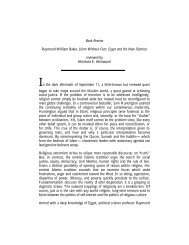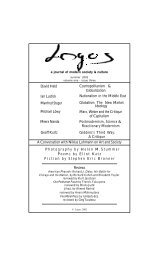Michael J. Thompson Stephen Eric Bronner Wadood Hamad - Logos
Michael J. Thompson Stephen Eric Bronner Wadood Hamad - Logos
Michael J. Thompson Stephen Eric Bronner Wadood Hamad - Logos
You also want an ePaper? Increase the reach of your titles
YUMPU automatically turns print PDFs into web optimized ePapers that Google loves.
Jason Schulman<br />
U.S. as the world’s main danger to peace, the publication of such comments<br />
could not have been more ill timed.<br />
Muravchik sees the dying out of the Israeli kibbutzim as the final nail in<br />
socialism’s coffin. But the kibbutzim, regardless of their adoption of the<br />
formula “to each according to their needs” (an impossibility under conditions<br />
of scarcity) or adoption of communal childrearing (not much of a priority<br />
outside of utopian colonies), were hardly pure institutions. In 1964, ninetytwo<br />
percent of kibbutzim were affiliated to companies which sold goods<br />
produced for a profit. This profit ended up in the hands of companies such as<br />
Koor (a major company of construction and manufacturing company) and<br />
AMPAL (American Israel Corporation, a finance company that directed U.S.<br />
capital investment in Israel), not Israeli workers. During the 1960s, more<br />
than fifty percent of kibbutz labor was wage labor, not voluntary labor, with<br />
the “dirty jobs” performed by foreign Jewish volunteers. This is not to<br />
mention the kibbutzim’s role in helping the Haganah army to drive out Arab<br />
inhabitants who had not already fled, confiscating their land, and later<br />
destroying the remaining houses—not exactly behavior exemplifying<br />
proletarian internationalism. 7 And the increasing social inequality in Israel,<br />
mirroring that in the U.S., goes unmentioned by Muravchik.<br />
Muravchik’s book ends with a return to the theme of socialism-as-religion,<br />
stating that in contrast to traditional religion, socialism “lacks any internal<br />
code of conduct to limit what believers may do. The socialist narrative turned<br />
history into a morality play without the morality.” Democratic socialism, he<br />
says, is a contradiction in terms; socialism is inevitably coercive. Of course,<br />
capitalism is coercive—it is based upon the coercion of market forces, backed<br />
up by state power. History has shown that capitalism is compatible with the<br />
most coercive possible governments, including ones that claim to be<br />
“socialist.” Capitalism is itself innately authoritarian. But the whole point of<br />
socialism, when it has not been hijacked by authoritarians, is not the elite<br />
engineering of the “New Man,” but the full democratization of political and<br />
economic power; indeed, the end of power itself as the organizing principle<br />
of social life. 8 This is the core of the “other soul” of socialism. It is still worth<br />
fighting for.<br />
<strong>Logos</strong> 2.3 – Summer 2003




